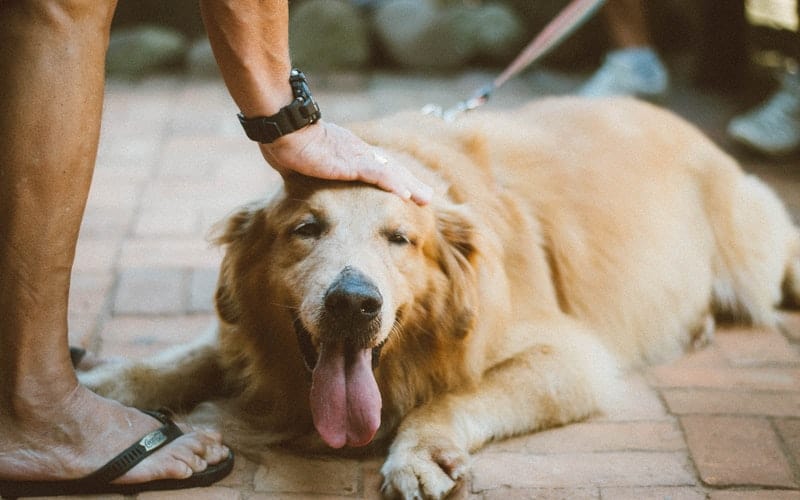Last Updated on November 13, 2023 by ellen
Are hot dogs OK for dogs to eat? Find out more about whether your dog can eat hot dogs or if they should avoid them.
Posts may be sponsored. This post contains affiliate links, which means I will make a commission at no extra cost to you should you click through and make a purchase. As an Amazon Associate I earn from qualifying purchases.
Table of Contents
Are Hot Dogs OK for Dogs?
You may be wondering if it’s OK for your furry friend to have a hot dog as an occasional treat or not. Are processed meats ok to give your pet or should you avoid hot dogs?
While it might seem like a fun idea to share your hot dog with your dog, it’s crucial to understand that not all human foods are safe for them to consume. Hot dogs are a type of processed meat, packed with additives that might be harmful to your pet’s health.
High levels of sodium, fats, and artificial preservatives present in hot dogs can lead to health issues in dogs, such as obesity and heart disease. Therefore, while an occasional small piece might not cause immediate harm, it’s best to avoid making hot dogs a part of your dog’s regular diet.
Should dogs eat hot dogs?
Exposing your dog to a diet rich in processed foods like hot dogs introduces several health risks. Firstly, the high sodium content can lead to increased blood pressure and potentially cause sodium ion poisoning, symptoms of which include vomiting, diarrhea, seizures, and in severe cases, it could even be fatal.
Processed meats, such as hot dogs, also typically contain artificial preservatives and flavor enhancers. These additives can cause allergic reactions in some dogs, leading to symptoms such as itching, swelling, and digestive issues.
Furthermore, the high-fat content in hot dogs can contribute to obesity in dogs, which in turn can lead to a multitude of other health problems. Being overweight increases the risk of dogs developing conditions like diabetes, arthritis, and heart disease. Therefore, it is crucial to stick to a well-balanced diet specifically designed for dogs to ensure they maintain optimal health.
The importance of a balanced diet for dogs
A well-balanced diet is the cornerstone of your dog’s overall health and wellbeing. Just like humans, dogs require a variety of nutrients in their diet — including proteins, carbohydrates, fats, vitamins, and minerals — to function optimally. Such nutrients should come from quality sources and be fed in the right proportions to ensure that all nutritional needs are met.
Protein is essential for the growth, maintenance, and repair of body tissues and to build antibodies that fight off infections. Fats provide energy and keep the skin and hair coat healthy. Carbohydrates are a source of quick energy and are necessary for the functioning of the nervous system. Vitamins and minerals are vital for many body functions such as bone growth, wound healing, and maintaining a healthy immune system.
Feeding your dog a balanced diet also helps prevent obesity and related health conditions. Overfeeding or feeding unhealthy treats frequently can contribute to weight gain, leading to conditions such as diabetes and heart disease.
A balanced diet for dogs also includes clean, fresh water which is crucial for digestion, nutrient absorption, and regulation of body temperature.
It’s important to remember that every dog is unique, with different dietary needs based on age, breed, size, and health status. Therefore, it is always best to consult with a veterinarian or a canine nutritionist to establish a feeding regime that ensures your dog gets a balanced diet tailored to their specific needs. Remember, a healthy diet equals a happy and healthy dog.
Alternative healthy treats
While hot dogs should not be a staple in your dog’s diet, there are many healthier treat alternatives that your furry friend may enjoy. Fresh fruits and vegetables such as carrots, blueberries, and apples (minus the seeds) are a great source of vitamins, minerals, and fiber. They’re low in calories and beneficial for your dog’s oral health.
Dehydrated sweet potatoes are also a popular choice for a dog treat. They are high in dietary fiber and contain vitamin B6, vitamin C, and manganese. Sweet potatoes are also a rich source of the antioxidant beta-carotene, which converts to vitamin A in your dog’s body and promotes healthy skin, coat, eyes, nerves, and muscles.
Another good option is plain, air-popped popcorn, which is a low-calorie treat that provides whole grain benefits, including fiber. However, it’s important to ensure that it is unsalted and unbuttered.
Lastly, lean, cooked meats like chicken, turkey, or fish can serve as a protein-packed treat that most dogs find irresistible. But remember, these should be served in moderation and without any seasonings or sauces.
Or make these cantaloupe dog treats. Your pet will love them.
Always remember to introduce new treats into your dog’s diet gradually and in small amounts to monitor for any signs of allergies or other adverse reactions. And, as always, it’s a good idea to consult with a veterinarian before introducing new foods into your dog’s diet.
Can I give my dog a hot dog?
If you want to give your healthy adult dog cooked hot dog as an occasional treat, it probably won’t be a problem. However, it should not be a large part of your dog’s daily calories.
Consider it a high value treat with very little nutritional value. They contain too much salt and are not good for your dog’s health. They are empty calories.
Most hot dogs and processed meat alternatives are made with preservatives like sodium nitrate. This can give your canine companion an upset stomach. Even worse, some contain onion powder which can be toxic to dogs.
These homemade yogurt dog treats are a better alternative.
Using hot dogs as a training treat
Never feed your dog whole hot dogs. A single hot dog can cause a choking hazard.
Some pet owners use pieces that have been microwaved as training treats. Cut raw hot dogs into bite sized pieces. Microwave them for 8 to 10 minutes. Yes, the hto dgs will be crunchy.
Adult dogs can have small quantities of these as a training aid. Too many are rough on your dog’s stomach and are not a healthy food to be part of your dog’s diet. They should only be a special treat.
Summary
So, should your dogs eat hot dogs? The average hot dog is not good for your pet. It can cause stomach upset and kidney or liver issues.
While they can be used as a high-value reward, they should be given sparingly due to their high calorie and sodium content, as well as their lack of essential nutrients. It’s wiser to opt for less calorie-dense treats that offer nutritional benefits, such as fresh fruits, vegetables, or lean meats.
Remember, feeding your dog a balanced diet promotes their overall health and well-being, and treats should only make up a small portion of their daily caloric intake. Always consult with your vet or a canine nutritionist to ensure you’re making the best dietary choices for your furry friend.
Instead, make these training treats. Or, pick up a bag of these treats for your pup.

Ellen runs a small pet sitting business in southern Vermont. She has experience with a variety of small animals, dogs and cats. She has also cared for ducks, chickens and rabbits. Combined, she has over 20 years of experience in pet care and pet sitting.





So helpful to know!!
My dig will literally eat anything (Plastic and metal included!!)
So it is useful to know what human food is suitable.
So glad you enjoyed the post!